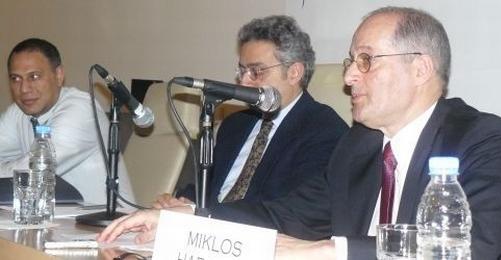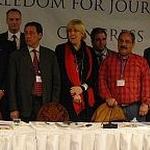"Pluralism in society guarantees freedom of press" said Representative on Media Freedom Miklos Haraszti from the Organization for Security and Cooperation in Europe (OSCE) in the "Freedom of Media" conference held at Bilgi University in Istanbul on 14 January.
The conference was initiated by the Human Rights Law Application and Research Centre of the Bilgi University Law School. Faculty member Prof. Dr. Turgut Tarhanlı indicated that OSCE does not only monitor violations of media freedom. Furthermore, the organization effectively puts forth the development of standards of media freedom in the perspective of commitments signed by the member states.
"Government should keep their hands off media contents
Haraszti will finish his duty this March after being with OSCE for the last six years. He stated, "At a point where Turkey cannot be compared any more to the times of military administration, I nevertheless observe unwillingness towards full liberation. Although the government is aware of the discrepancy between article 301 of the Turkish Criminal Code (TCK) and freedom of press, political reasons prevented the undertaking of measures", Haraszti argued.
"The government should keep their hands off media contents within the scope of freedom of expression, regardless of Kemalist, religious or national contexts. It is article 301 that casts a shadow over this neutrality. If problems in the Criminal Code can be solved by the Media Law, the government is mistaken to insist on a solution within the criminal law. Exhibiting press activities as crimes is unacceptable", Haraszti explicated.
"The government's approach of stalling legal guarantee of press freedom until 'the media becomes more mature' is wrong. In fact, only a fully liberated media can carry full responsibility. Reciprocity is nothing that can be imposed on the media" Haraszti said and moreover criticized the implementations imposed on Taraf newspaper and the Doğan Group.
"Cultural understanding should be mutual"
Haraszti pointed out that the 56 member states of OSCE all have their specific problems. In Ireland, for instance, the organization required to abolish the regulation on punishment for "attacks on religion". He also told the audience about the similar case of Pakistan, where the United Nations was not able to solve the problem despite an initiative carried out via the Islamic Development Organization (IDO). "Efforts should be concentrated on other issues but thinking in terms of penalties".
Haraszti also mentioned the caricature crisis in Denmark, which highlighted the media's diverse readership considering global and cultural areas. "A mutual cultural understanding should be really mutual. The Danish newspaper had to consider the reactions coming from the Muslim world", he said.
Akdeniz: Internet law should be amended or abolished
Bilgi University faculty member Assoc. Prof. Dr. Yaman Akdeniz prepared a report on "Turkey and Internet Censorship" commissioned by OSCE. He called Turkey for reforms of law no. 5651 on the "Regulation of Publications on the Internet and Suppression of Crimes Committed by means of Such Publication" according tot he proposals he made in his report.
Akdeniz gave a brief summary of his report. He drew attention to the internet site youtube which has been blocked to access for one and a half years now. According to Akdeniz, youtube officials refrain from opening an office in Turkey because "they do not want to deal with obstacles such as access bans and similar demands frequently issued by courts and the Telecommunications Communication Presidency (TİB)".
Akdeniz also reminded that apart from TİB's referring to "catalogue crimes" regulated in law no. 5651, access has been blocked to Özgür Gündem, Keditör, Günlük newspapers and websites belonging to Richard Dawkins by implementing regulations related to insult. Akdeniz claimed, "Law no. 5651 should either be revised or abolished". (EÖ/VK)














